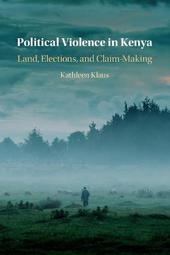
|
Political Violence in Kenya: Land, Elections, and Claim-Making
Paperback / softback
Main Details
| Title |
Political Violence in Kenya: Land, Elections, and Claim-Making
|
| Authors and Contributors |
By (author) Kathleen Klaus
|
| Physical Properties |
| Format:Paperback / softback | | Pages:373 | | Dimensions(mm): Height 229,Width 152 |
|
| ISBN/Barcode |
9781108726467
|
| Classifications | Dewey:303.6096762 |
|---|
| Audience | | Professional & Vocational | |
|---|
| Illustrations |
Worked examples or Exercises; 20 Tables, black and white; 2 Maps; 8 Line drawings, black and white
|
|
Publishing Details |
| Publisher |
Cambridge University Press
|
| Imprint |
Cambridge University Press
|
| NZ Release Date |
1 September 2023 |
| Publication Country |
United Kingdom
|
Description
Examining a key puzzle in the study of electoral violence, this study asks how elites organize violence and why ordinary citizens participate. While existing theories of electoral violence emphasize weak institutions, ethnic cleavages, and the strategic use of violence, few specify how the political incentives of elites interact with the interests of ordinary citizens. Providing a new theory of electoral violence, Kathleen F. Klaus analyzes violence as a process of mobilization that requires coordination between elites and ordinary citizens. Drawing on fifteen months of fieldwork in Kenya, including hundreds of interviews and an original survey, Political Violence in Kenya argues that where land shapes livelihood and identity, and tenure institutions are weak, land, and narratives around land, serve as a key device around which elites and citizens coordinate the use of violence. By examining local-level variation during Kenya's 2007-8 post-election violence, Klaus demonstrates how land struggles structure the dynamics of contentious politics and violence.
Author Biography
Kathleen F. Klaus is Assistant Professor of Politics at the University of San Francisco where she specializes in African politics, political violence, land rights, and forced migration. Her dissertation won the APSA Best Field Work Award in (2016). She has received research funding from the Social Science Research Council, Harry Frank Guggenheim Foundation, the United States Institute for Peace, and the National Science Foundation, among others.
Reviews'This book provides a powerful analysis of collective land narratives, and connects these narratives to elite and citizen coordination of electoral violence. This insightful and compelling research connects institutional factors that shape land access and security to the construction of narratives, which ultimately reflects on the relationship between democratization, political violence, and post-conflict politics.' Rachel Beatty Riedl, Cornell University, New York 'Why do elections turn violent in some local contexts but not in others? Based on comparisons of communities, interviews, and a novel survey in Kenya, Klaus finds that it is the interplay of contentious land narratives, land inequality and politicians acting as land patrons that allows elites to mobilize citizens for violence - and citizens to follow. With its thorough argument and rich empirical approach, Klaus takes us to a new level of understanding of a phenomenon that plagues democracies around the world.' Ana Arjona, Northwestern University, Illinois 'Klaus tackles a question central to the success of fragile democracies - when will ordinary people use violence during and after elections? Land, as the resource that most shapes identity and economic well-being, is central to her argument. Klaus's multifaceted empirical strategy is impressive. Her extensive qualitative evidence yields unique insights into how people understand land inequality and the process by which conflict escalates. A remarkable contribution to our understanding of electoral violence.' Kimuli Kasara, Columbia University, New York
|